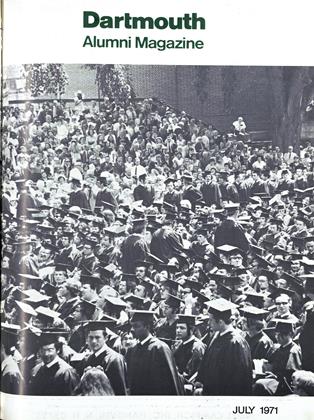MEMBERS OF THE CLASS OF 1971, I had the pleasure of attending two other commencements recently, and although they were very lovely occasions, somehow the personal element was missing from them. I'm very happy that we still do give out degrees individually, we still hood recipients of doctorates individually, and may it ever be so at Dartmouth.
This morning I was called early to make a difficult decision—l was told that the weather could go either way. You know that I'm an eternal optimist and therefore we are out here. Somehow I felt the report I got this morning was symbolic of the Class of 1971—which could go either way.
I think your class has seen more turmoil and changes of mood on campuses than any class in the history of higher education. It is difficult for me to think of you as one class because it seems to me you were a different class in each of four years. The big question that all the news media are asking this year is: why were you so silent? And the usual answer has been that you were discouraged and defeated. I have thought about this a great deal and I have reached the conclusion that that is the wrong answer. Your difficulty is not that you have lost but that you have won.
As I have heard you, you fought on three major issues: you tried to change the values of society on war, on racism, and on saving of the environment. And on those three issues, the majority is now with you; a minority must shout to be heard. Perhaps it is in the nature of majorities to be silent.
Of course, there was a fourth issue on which you fought, and this was "the nature of the university." Perhaps you were more silent on this because the university has been more responsive to your requests, although both you and I are still learning just how hard it is to get a consensus for change.
You may also have found out that colleges are fragile, and I have been quite moved by the number of you who have come to talk to me to express your worry about the future of this institution. And I must confess that I was quite flabbergasted when I heard that the Class of 1971 became the first senior class to organize contributions to the Alumni Fund. This symbolic gesture indicates that you do care.
And with all that turmoil and all that change a final irony was presented to you when in your last year this new depression of the American economy came and many of you could not find jobs. Everyone was rushing to the same professional schools—mostly of law and medicine—and therefore many of you who in other years would have qualified easily failed to qualify this year. In a way, I have the feeling that civilization has given you every possible excuse to drop out, and indeed man does not need much excuse to avoid hard work. But I feel that the days of rhetoric are over because there is a new silent majority that supports the fundamental goals for which you have argued. It is now the time for hard work. It is your willingness to sacrifice for civilization that is necessary and it is your talents that are needed in order to correct the ills of society.
I therefore charge you, members of the Class of 1971, not to cop out, not to crawl into a selfish shell no matter how much you are tempted, because your fellow man needs you.
Men of Dartmouth, all mankind is your brother, and you are your brother's keeper.
 View Full Issue
View Full Issue
More From This Issue
-
 Feature
FeatureThe Commencement Address
July 1971 By GUNNAR MYRDAL, Sc.D. '71 -
 Feature
FeatureAlumni Council Honors Seven
July 1971 -
 Feature
FeatureThe Fifty-Year Address
July 1971 By JOHN L. SULLIVAN '21 -
 Feature
FeatureHONORARY DEGREE CITATIONS
July 1971 By honoris causa. -
 Feature
FeatureCOMMENCEMENT 1971
July 1971 By CHARLES J. KERSHNER -
 Feature
FeatureMcCulloch Heads Council
July 1971
John G. Kemeny
-
 Article
ArticleStatement by the Board of Trustees
February 1977 By F. WILLIAM ANDRES, John G. Kemeny -
 Feature
FeatureThe Computer at Dartmouth
FEBRUARY 1966 By John G. Kemeny -
 Article
ArticlePresident Kemeny to President Nixon...
NOVEMBER 1970 By John G. Kemeny -
 Article
ArticleThe road less traveled
DECEMBER 1971 By John G. Kemeny -
 Feature
FeatureWHEN THE YOUNG TURKS CAME
December 1990 By John G. Kemeny -
 Article
ArticleA Compressed Life
February 1993 By John G. Kemeny
Features
-
 Feature
FeatureHONORARY DEGREE CITATIONS
JULY 1970 -
 Cover Story
Cover StoryA CAMPAIGN CELEBRATION
MAY 1983 -
 Feature
FeatureBefore the Revolution
October 1975 By ALBERT F. MONCURE JR., RONALD V. NEALE -
 Cover Story
Cover StoryDesigning the Future
Sept/Oct 2002 By Brian Dumaine -
 Feature
FeatureA Dartmouth History Lesson for Freshmen
December 1957 By FRANCIS LANE CHILDS '06 -
 Cover Story
Cover StoryHoney, They're HOME
January 1996 By Mary Cleary Kiely '79


